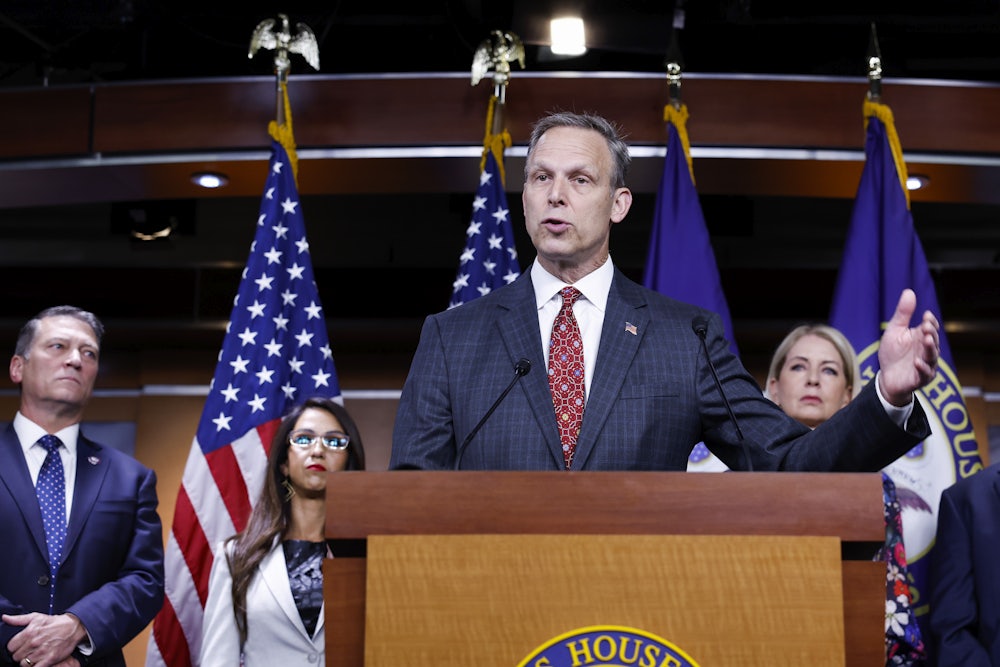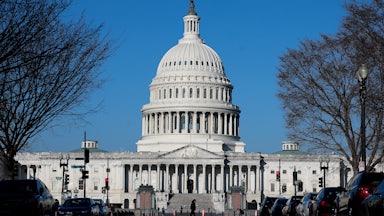With little more than a month left until the government is set to run out of funding, it appears increasingly likely that Congress will need to pass a stopgap spending measure to prevent a shutdown. But opposition from conservative House Republicans could stymie efforts to pass such legislation, known as a continuing resolution or C.R.
Thanks to a divided Congress and an emboldened right flank in the House, lawmakers will likely face yet another round of procedural brinkmanship when they return to Washington in mid-September. The stakes are high for the economy—the Congressional Budget Office reported that the last time there was a government shutdown, it cost the economy $11 billion and slowed the rate of economic growth by nearly a full percentage point—as well as some of the key institutions that should ostensibly garner bipartisan support.
On Monday, the House Freedom Caucus announced in a statement that its members would oppose any short-term spending measure that did not meet certain criteria. In order for the group to take an official position, an overwhelming majority of its nearly four dozen members must agree—which, given Republicans’ five-seat majority in the House, is more than enough to sink any legislation attempted to pass along a party-line vote.
Those stipulations would require the C.R. to include a hard-line immigration bill, address “the unprecedented weaponization of the Justice Department and the FBI,” and end “the Left’s cancerous woke policies in the Pentagon.” The group would also oppose a supplemental spending bill to provide additional aid to Ukraine requested by President Joe Biden. The recent emphasis by conservative Republicans on “wokeness” in the military, reiterated in this statement by the Freedom Caucus, highlights how GOP lawmakers believe this is a salient issue for their base.
Although the Freedom Caucus statement does not specify the exact “cancerous woke policies in the Pentagon,” a spokesperson for the group pointed to provisions included in the House-passed National Defense Authorization Act in July. That bill would prohibit the Defense Department from reimbursing expenses related to abortion services, prevent health care coverage of transgender surgeries or hormone treatments, ban drag shows on military grounds, bar the teaching of critical race theory in the military, limit diversity training, and prevent the Pentagon from carrying out President Joe Biden’s climate-related executive orders. The House version of the NDAA passed largely along party lines and is dead on arrival in the Democratic-controlled Senate.
“The military is not the place for a social experiment. The military needs to be focused on readiness and lethality, and all these other things are distractors from that and harm our national security,” Representative Scott Perry, the chair of the Freedom Caucus, said in a press conference last month. GOP Senator Tommy Tuberville has been waging his own war on abortion policy in the military in his one-man quest to block the nominations of military personnel unless the Biden administration rescinds its order allowing the military to reimburse out-of-state abortion services and care.
Republicans contend that such “woke” policies are responsible for a recent decline in recruitment and the plummet in public confidence in the military. This year, the Army is set to fall 15,000 short of its recruitment targets, the Navy expects to fall 10,000 short, and the Air Force 3,000 short. Confidence in the military has also dropped dramatically, falling to 60 percent in July, according to a Gallup poll. That decline has been particularly significant among Republicans, decreasing from 91 to 68 percent in three years.
However, the military’s social policies may not be the primary culprit in this decline in recruitment. A 2022 study by the Defense Department found that 77 percent of young Americans would not qualify for military service without a waiver due to their weight, drug and alcohol use, and physical and mental health. Forty-four percent of youth were disqualified for multiple reasons. For example, using marijuana, which is legal in many states, could disqualify someone from serving without a waiver, as could the use of medications to treat mental health conditions such as ADHD.
As the military is an all-volunteer force, these hurdles to qualification compound existing issues with recruitment. The bump in military recruitment that occurred after the terrorist attacks of September 11, 2001, has also eased over the past two decades, with the chaotic U.S. withdrawal from Afghanistan potentially further depressing confidence in the military. Moreover, faith in democratic institutions overall has recently been on the decline among Americans, and particularly young people.
There is also some indication that the Republican fixation on opposition to “wokeness” may not appeal to more moderate and independent voters. A March USA Today/Ipsos poll found that 56 percent of Americans overall believe that the term should be defined as being “informed, educated on, and aware of social injustices,” although 56 percent of Republicans believe it means “to be overly politically correct and police others’ words.”
Recent polling by The New York Times/Siena College also found that potential Republican primary voters would be more interested in supporting “a candidate who focuses on restoring law and order in our streets and at the border” or “a candidate who says that the government should stay out of deciding what corporations can support” than they would “a candidate who focuses on defeating radical ‘woke’ ideology in our schools, media and culture.”
Still, given the inclusion of culture-war provisions in the House-passed NDAA and the defense appropriations measure considered in the House, it’s likely that the ultimatum by the Freedom Caucus is a warning shot for the fight to come over passing a continuing resolution. With congressional Democrats in favor of approving a so-called “clean” C.R.—that is, one that does not include any controversial provisions tacked onto the substance of the bill—Republican leadership will need to determine whether it is more important to pass such a measure on a bipartisan basis or appease its right flank.
The last time Speaker Kevin McCarthy relied on Democratic votes to pass such a significant measure—in this case a bill raising the debt limit—a crew of conservative representatives retaliated by grinding floor proceedings to a halt for a week. Moreover, the partisan NDAA passed in the House indicates that such ideological positions are the mainstream of the party, rather than simply belonging to the fringe.
If a government shutdown does occur, it will affect the very institution that members of the Freedom Caucus aim to protect. Congress has previously passed legislation to protect military pay and care for veterans in the event of a shutdown, but other services could be affected, such as day care and commissary operations and nonessential travel and training. In 2018, a shutdown resulted in a significant delay in Coast Guard pay. Nonessential civilian workers would also be affected by a shutdown, and sent home until a deal is reached.
As with Tuberville’s hold on military nominations, there does not appear to be a resolution in sight for the Freedom Caucus’s demands. But if continued government spending hinges on the repeal or inclusion of controversial military policies, with limited time to find a consensus, then a shutdown could be more likely than not.










